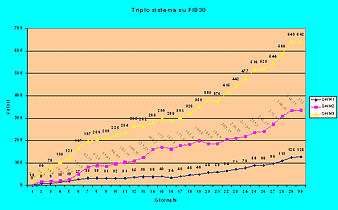BORSA & LOW RISK SYSTEMS
A System allowing you to operate profitably on the Stock Exchange and in all the probabilistic systems!
Presentation of the book-cd
A System allowing you to operate profitably on the Stock Exchange and in all situations where uncertainty prevails. Very daring! There are so many Systems around, perhaps too many. According to experts, at best they can help to earn a living. Nothing to be underestimated, if we consider the extreme complexity of the issue. What we are presenting here is a Triple System of attack offering great results that can massively reduce chances of hazard. It seems impossible. And yet, after clarifying the premises, which are a bit complicated indeed, the problem will fall within the range of solvability.
When talking of Stock Exchange, we refer to derivatives and Futures. Why is that? Because the variation in their value is essentially a binary equiprobable series behaving like a roulette wheel or a coin toss: red or black, heads or tails, a going up or going down value. We must specify that the S&P/MIB is the new Italian benchmark stock market index for “Futures” and all other derivatives.

FROM BOOK-CD
I first came across these probabilistic questions about 40 years ago. I rarely went to gambling houses, but I can say that, from the very first day, intrigued me from the perspective of pure mathematics. I was immediately convinced that a truly valid system that could foresee sure results should be possible. Therefore, I started to read books on this topic, some of them well and honestly written.
However, I soon realized that most of the proposed systems were the same ones repeated again and again over several decades; only a few were of any worth, and some were risky. I tried several of them out theorethically through many simulations. Over the years, by passionately devoting part of my spare time to this problem, I acquired unusual experience. Since the first year, I focused only on systems related to simple bets: red and black, even and odd, passe and manqué, dozens and columns. Bets on numbers offer meagre hopes; books do not deal much with them because a System on numbers can only complicate already serious problems, for it is necessary to enter a higher level of complexity.
I do not think there are many people in the world who have scrutinized the series of random equiprobable events exploring the fascinating mathematic branches of the combinatorial calculus and probability with a greater dedication than mine. If I had not done this, it would have really been too easy to make a blunder or hit a dead end.
To view documents, installs Acrobat Reader.




